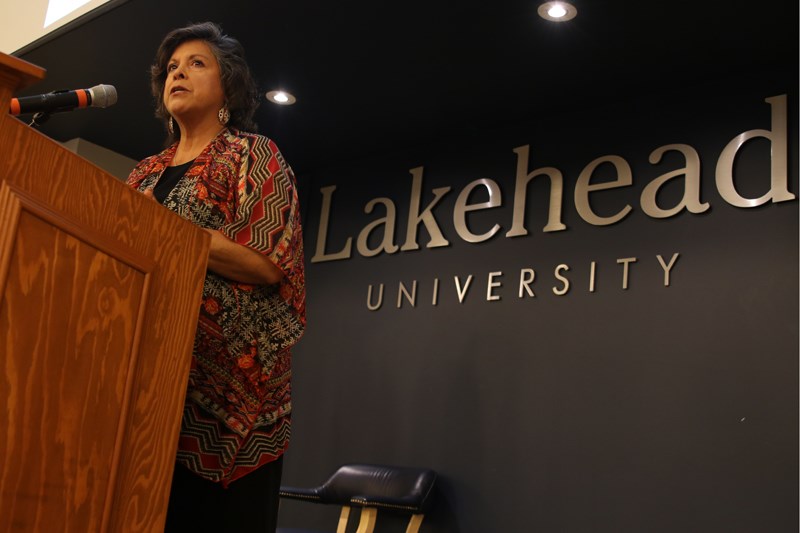THUNDER BAY – When the Truth and Reconciliation Commission named Cynthia Wesley Esquimaux an honourary witness, she took on reconciliation as a life-long responsibility.
The nature of that responsibility has become clear over the last three years and on Friday, her work was granted a new and official title.
Wesley-Esquimaux was named Lakehead University’s chair on truth and reconciliation at a dignitary-studded ceremony at the Bora Laskin Faculty of Law. It’s the first such position created in any Canadian university.
Wesley-Esquimaux will be an official point person for reconciliation both on Lakehead University’s campuses and across Northwestern Ontario.
“It’s the perfect step into an official role that says, ‘yes, I know I’m a target in some ways too, for people who don’t necessarily agree with this conversation but also a beacon of hope for people who do,’” she said.
Wesley-Esquimaux is advocating that universities commit to more than simply Indigenous advisors. Putting some of Canada’s 4,000 Ph.D. Indigenous graduates on tenure track, making them full professors on faculties where they can support those among the 8,000 Indigenous Master’s graduates and increase that number even further.
She’s also advocating for improvements to Lakehead’s distance education program, suggesting the school wants to put an end to the connection between Indigenous education and the physical displacement of on-reserve students.
“We need prior learning assessments for people coming back to school, we need to be able to create the kinds of educational processes that allow people to stay in the community where they are so we don’t brain drain our north so we don’t insist people come down here to Thunder Bay Winnipeg and all these places so they get an education,” Wesley-Esquimaux said.
“They can stay where they are because if they come out for six or seven years, they’re not going back. We’ve now taken out some very key social justice players and that’s not something Lakehead wants to continue to do.”
Minister of Indigenous and Northern Affairs Carolyn Bennett called Wesley-Esquimaux “fearless” in the way she insists how reconciliation must look and feel.
“It’s totally exciting and exhilarating to gain someone of Cynthia’s stature and experience but with diligence, now has this chair,” Bennett said.
“It allows for the freedom to be able to determine what she thinks is needed and how we go forward, not only in the academy here at the university but in the province and in the county. This becomes a stronghold of a commitment we hope will happen coast to coast to coast.”
Ontario Regional Chief Isadore Day advised that reconciliation needs to include “de-entrenching” colonial institutions. He challenged Bennett and her provincial counterpart David Zimmer to commit to spending a day with the Confederacy, which Wesley-Esquimaux would facilitate, dedicated exclusively to reconciliation. Both accepted that invitation.
“We had the Royal Commission on Aboriginal People released in 1996. The commission looked at self-government and the well-being of First Nations in Canada,” Day said.
“Twenty years later, we see the Truth and Reconciliation Commission’s report on residential schools. This report looked at the people aspect and the need for a major movement in healing. Perhaps taking the Indian Act, Indian Residential Schools and all Indian policies in between and truthfully examining the colonial configuration through the lens of reconciliation is a good starting point.”
